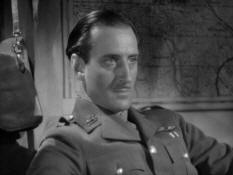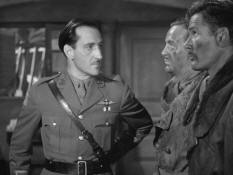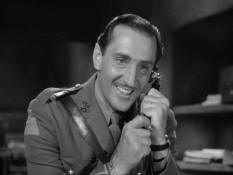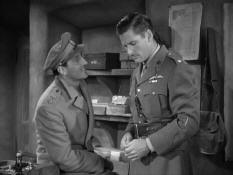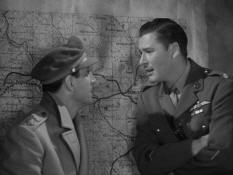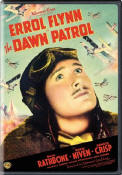The Dawn Patrol
|
| The Dawn Patrol Superb remake of classic war drama marked by fine acting and excellent direction. This remake of the picture originally done in 1930 with Richard Barthelmess playing the lead part now taken by Errol Flynn, can honestly be recorded as a superior production. In view of the present tense atmosphere in Europe, this looks as if it will score as strong as the first production which was a sensation of its time and made box-office history. The original story of John Monk Saunders is used and those who did the screenplay are again credited. The scene is on the British front during the war, at the squadron headquarters of the Royal Flying Corps, 59th Squadron. Rathbone as the major in command does a magnificent job registering the breaking nerves of an officer feeling himself responsible for sending up the young and inexperienced flyers to certain death against the superior force of the enemy. When he is promoted to headquarters, Errol Flynn takes over, and he in turn experiences what his former commander went through when he is reviled by his buddy, David Niven, for sending the latter's young brother to his death. The climax carries tremendous suspense as Flynn flies inside the enemy lines on a suicide mission to try to blow up the ammunition dumps, a job which Niven had volunteered for, but his superior beats him to it. In this way he atones for the death of his friend's brother. The picture emphasizes the futility of war, and all its misery and foolishness, and on this angle rests its appeal for the femmes, for there is no romantic interest anywhere in the story, and no feminine character. The work of all the principal players is splendid. The direction is something to cheer about. a really superior war picture in every sense. —The Film Daily, December 14, 1938 |
Rodion Rathbone, Basil's son by his first marriage, plays one of the young, inexperienced pilots, named "Russell." He appears near the beginning of the film, speaks a few lines, and then flies off on his first mission. He is shot down over enemy lines.
Hollywood magazine reported that Basil Rathbone had "what he claims to be the most unusual, unnerving experience in his life when he had to play a scene in Dawn Patrol opposite his son Rodion who was cast as a recruit. Basil became so confused that he blew up in his lines."1 The scene with Basil and Rodion together must have been cut; they don't appear together in the film. The article also mentioned that Rodion was employed at Warners as a film cutter but gave up his work to try his skill at acting. In the two films that he made, he used the name John Rodion.
Another young Englishman of interest in the cast is Michael Brooke, who played Squires, leader of B flight. In private life, he was the Earl of Warwick.
Two other actors, Anthony Marsh and John Meredith, played raw recruits in the 1930 Dawn Patrol; and seasoned flyers in the remake.
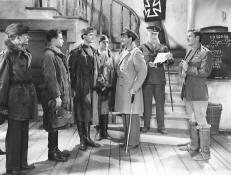 A scene that was cut from the film: Rathbone greeting the new recruits, including Lt. Russell (Rathbone's son, Rodion) |
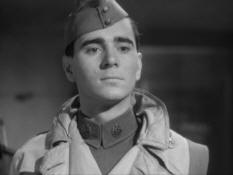 Rodion Rathbone, age 23 |
The Dawn Patrol is a remake of the picture originally made in 1930, with Richard Barthelmess and Douglas Fairbanks Jr. in the roles of Courtney and Scott. Neil Hamilton played Major Brand. It seems strange to do a remake just 8 short years after the original. The original film was a success, but was embroiled in controversy. Howard Hughes sued Warner Bros, alleging that it plagiarized his film Hell's Angels (1930).2 Although Warner's won the lawsuit, the controversy may have been a contributing factor to the studio's decision to remake the film in 1938 rather than re-release the 1930 Dawn Patrol. A likely reason for Warner Bros to remake Dawn Patrol was Errol Flynn. The studio had a "golden goose"—a popular star who would be a big box-office draw. Warners no doubt thought a new Dawn Patrol starring Errol Flynn would be a big hit—and it was! Some of the aerial footage and the shots of the munitions depot explosions from the 1930 film were used in the 1938 film.3
The aerial footage was also used in a later film, British Intelligence (1940).4 Here is an interesting video comparing the aerial shots used in British Intelligence and Dawn Patrol (1938): http://youtu.be/FI3iX-wJh9w
You can see a preview clip of the 1930 version for comparison: http://youtu.be/LoSdYaa-RCY
Not all of the aerial footage was culled from the Warners archives. Two dozen ancient Nieuports and Fokkers were reconditioned for use in the 1938 Dawn Patrol.5 In addition to using the vintage aircraft, Warner's wanted to use a famous stunt flier named Douglas Corrigan (nicknamed "Wrong Way" Corrigan) in the film. But Corrigan wanted $100,000—an amount that the studio was not willing to pay.6
| The Dawn Patrol A few ... a very few pictures are timeless in their appeal. A few ... a very few pictures may be revived year after year without seeming quaint or out-of-date or downright silly. Dawn Patrol is one of the very few films which will survive this year and next and as many years to come as there are people who remember wars. I wish it might be shown every year to every graduating class of every high school. I wish it might be included in every course of American History in every school in the land. I hope that it is revived every year, so long as bullets are being cast and battleships are being made, because, like every great war film that the motion picture industry has produced, it says "Where is the glory, where is the great adventure, where is there anything but criminal waste in such insanity?" With the exception of one or two lines, there is no such preachment in words in the film. There does not need to be. The action, itself, speaks louder than any spoken opinions; the action and some of the most brilliant playing you can hope to see. The film opens in headquarters behind the lines of the Fifty-ninth Squadron of the Royal Flying Corps. It is the year 1916. Major Brand (Basil Rathbone) is waiting to count the roaring motors of Flight A as it returns from the dawn patrol. On orders from headquarters, he had sent out seven men in seven rickety canvas-covered crates. He cannot hope that more than half will return ... it is impossible. Half of Flight A is made up of recruits just out from training school. Many have less than ten hours in the air, and they are fighting against such crack fliers as the German ace, von Richter. Brand is close to the breaking point. He cannot refuse to obey orders. He cannot take over the dangerous flights himself. He must sit in safety behind his desk and send young boys out to certain death in rickety canvas-covered crates. Basil Rathbone sets the whole mood of the film with his performance in these first scenes. Because of the way words snap from his strained mouth, he convinces you that Brand dares to speak no more than necessary words for fear he will burst into an hysterical protest. His gestures are the same ... so restrained that they are an expression of intolerable tension. The two best fliers of the squadron, Captain Courtney (Errol Flynn) and Lieutenant Scott (David Niven), are taking the war very differently. All they have to do is try to obey impossible orders, and about those orders they have a protective fatalism. Once back on the ground again, they can forget, or at least ignore the duties of the next day, in drink or roistering descents on the town. If you have been thinking of Errol Flynn as a young man whose equipment as an actor seemed to consist entirely of good looks and a nice smile, change that opinion right now. He may not have done much acting in the past, but with this performance he demonstrates a great talent, beyond argument. It will be a long time before you forget the way he delivers the speech telling of his best friend's death whole one hand fumbles without purpose at the leaves of a magazine. You won't forget for a long time the painful control in his voice when he says gently "Sleep tight," in a last toast to his comrade. You won't forget the detached, almost disinterested calm with which he circles his bomb-laden plane above the munitions depot. Basil Rathbone and Errol Flynn give brilliant performances in Dawn Patrol. David Niven as the joyous rather lightwitted Scotty who is childishly susceptible to alcohol and fun and laughter; Donald Crisp as the steady, sane aide who carries on, no matter what comes; Melville Cooper as the talkative emotional orderly; all of the carefully chosen cast deserve the highest credit for parts in a photoplay which could not be more convincing. —Llewellyn Miller, Hollywood magazine, February 1939 |
According to Warner's press book, only two sets were built for the film, one indoor set and one outdoor set. The one on stage seven, largest sound stage in the world, represented the interior of a two-story French farmhouse serving as headquarters for the 59th Squadron, Royal Flying Corps. The outdoor set represented the exterior of the same farmhouse. Together with the canvas airplane hangars and the adjoining flying field, it covered an area of nearly eight acres. The entire action of the picture takes place either in the rooms of the farmhouse, on the flying field, or in the air.
Variety (August 17, 1938) reported that two dozen ancient Nieuports and Fokkers were reconditioned for use in The Dawn Patrol. During filming, nine plans were crashed, burned, and otherwise destroyed.
Production began on August 4, 1938. Warners rushed editing the film, wanting to release it on Armistice Day (November 11, 1938), but that didn't happen.7 The film was released in some markets on December 17, and released nationwide on December 24.
The Dawn Patrol had a powerful impact on viewers. One young man, Murrell C. Wellman from Joliet, Illinois, wrote a letter to the editor of Silver Screen magazine: "It is now many weeks since I saw Dawn Patrol but the impression it made shall remain with me as long as I live. I am in my twenties—a potential soldier, but whatever glamour war formerly held for me, was lost in the senseless slaughter of those young lads. Hollywood has more influence over our present and coming generations than any president. So Hollywood, give us the sermons we need—sow the seeds of peace in the heart of every human being. Give us more pictures that 'pack a punch'—the Dawn Patrol variety." The letter was published in the May 1939 issue of Silver Screen.
Basil Rathbone served as a second lieutenant in the first World War. In 1918, he was awarded the Military Cross for bravery under fire. He wears his own decoration in The Dawn Patrol.8 Read more about Rathbone's experiences in The Great War.
Unbelievably, The Dawn Patrol (1938) wasn't nominated for any Academy Awards. However, John Monk Saunders won an Academy Award for best original story in connection with the 1930 Dawn Patrol.
| The Dawn Patrol The Brothers Warner have been very successful making unusual pictures and while it is true Dawn Patrol has been made before (in 1930), still it is also true that to a whole new generation of moviegoers, surfeited with love triangles, this stirring aviation war drama of men without women will prove a completely satisfying and thoughtful experience. Stressing the "War is Hell" angle, it builds up an amazing and gallant picture of heroism, horror and deep friendship among the men in the Royal Flying Corps in France in 1915. The combat scenes in the air are continuously thrilling, stunningly photographed and the whole is carried to a logical if tragic conclusion. You will weep watching a flight commander, Basil Rathbone, spiritually disintegrate under the task of sending men to their death in "old crates patched up with spit and a few wires" against the might of expert German squadrons. Errol Flynn, his captain, accuses Rathbone of being an executioner, until he himself is made commander and in turn has to send the young brother of his best friend (David Niven) to certain death. Later when Niven volunteers for a lone mission, Errol goes in his place. It is not a pretty tale, but the solid direction of Edmund Goulding prevented any maudlin sentimentality. David Niven emerges as a potential star of great magnitude; Flynn himself is capable, without any fireworks; Basil Rathbone, though inclined to keep that menace glint, is satisfying; Donald Crisp and Carl Esmond are outstanding. —Photoplay, February 1939 |
"The film has pace, stunning aerial shots, a magnificently destructive scene of the munitions dump explosion—and not a woman in its cast. The players generally seem squadron-trained, especially Mr. Rathbone's frayed commander, David Nivens's irrepressible Scotto, Carl Esmond's captive German flier, Donald Crisp's pipe-puffing aide." —Frank S. Nugent, New York Times, December 24, 1938
"A powerful screen drama, Dawn Patrol is a stirring plea for peace as well as excellent entertainment. Without such notably fine performances by the principals in the cast the picture might have verged on the melodramatic, but as it is, even the most harrowing scenes have credibility and plenty of punch. ... Basil Rathbone, as the British squadron commander whose job it is to send these boys into the slaughter, gives a memorable performance." —Modern Screen, July 1939
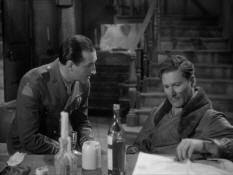 Rathbone and Flynn |
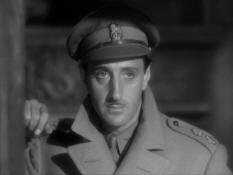 Rathbone |
See Page Two for more reviews and pictures from The Dawn Patrol. See Page Three for pictures of posters, lobby cards and promo photos.
.
|
Images on this page and pages 2 and 3 are from the film The Dawn Patrol, copyright Warner Bros. Films.
|
The Dawn Patrol is available on DVD
|
Notes
- Hollywood magazine, November 1938, p. 17
- Exhibitors Herald-World, August 9, 1930, p. 35
- Jack Harwick and Ed Schnepf. "A Viewer's Guide to Aviation Movies". The Making of the Great Aviation Films, General Aviation Series, Volume 2, 1989. p. 56
- Wikipedia's entry on The Dawn Patrol 1930, http://en.wikipedia.org/wiki/The_Dawn_Patrol_(1930_film)
- Variety, August 17, 1938, p. 31
- Independent Exhibitors Film Bulletin, July 30, 1938, p. 8
- The Film Daily, Oct. 3, 1938
- Turner Classic Movies' article on The Dawn Patrol, https://www.tcm.com/tcmdb/title/606/the-dawn-patrol#articles-reviews?articleId=62569







